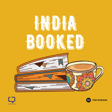
India Booked | Gujarat, Dhumketu, and Translations
Writer, literary translator, book critic and a literary podcast (Desi Books) host herself, Jenny Bhatt speaks to Ayushi Mona how the themes of Dhumketu’s books resonated with the short stories of her own, prompting her to bring out her debut literary translation, ‘Ratno Dholi: The Best Stories of Dhumketu’.
In this hour-long episode on short stories and translations, Jenny describes, through brilliant metaphors, how a short story differs from a novel and why it is unfair to expect authors with different skillsets to master both, and about the commercial pressures on writers in the publishing industry.
Recommending works by other luminaries in the field, Jenny talks about how regional translations break stereotypes and create a better understanding of diverse cultures, and touches upon the deficit representation of Indian literature in school curriculums and of Gujarati literature being translated in comparison to other regional languages. Tune in now!
